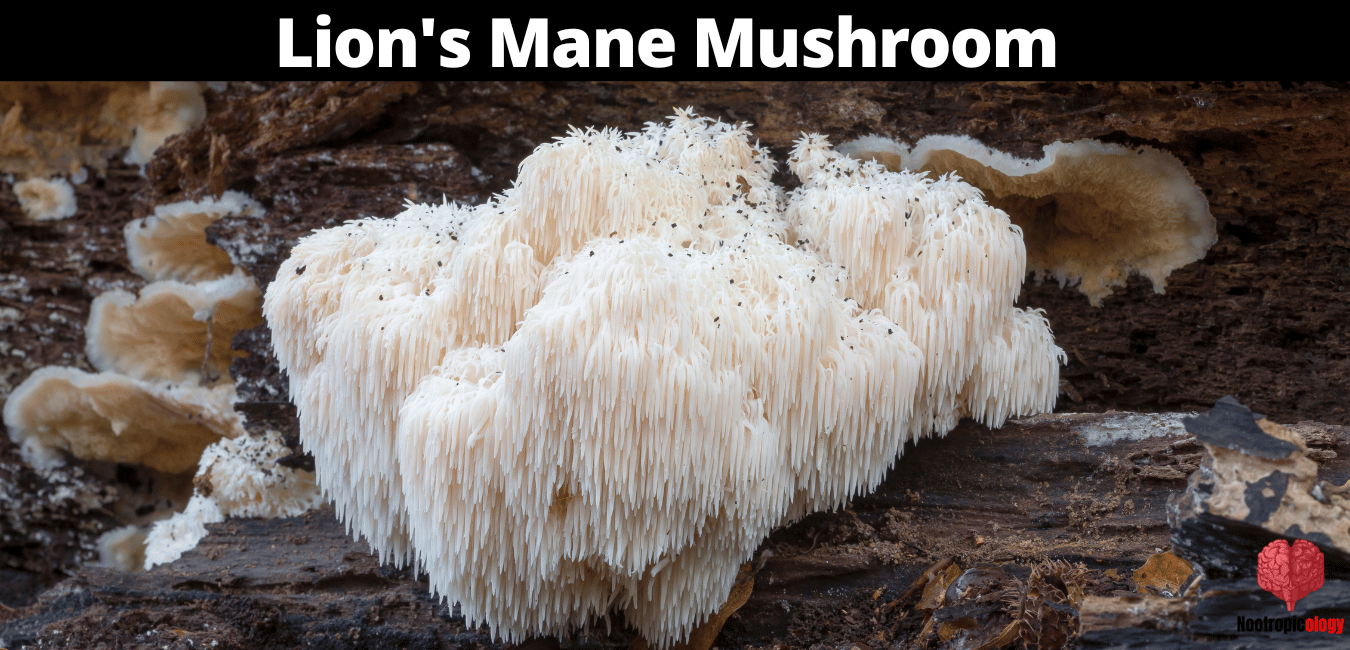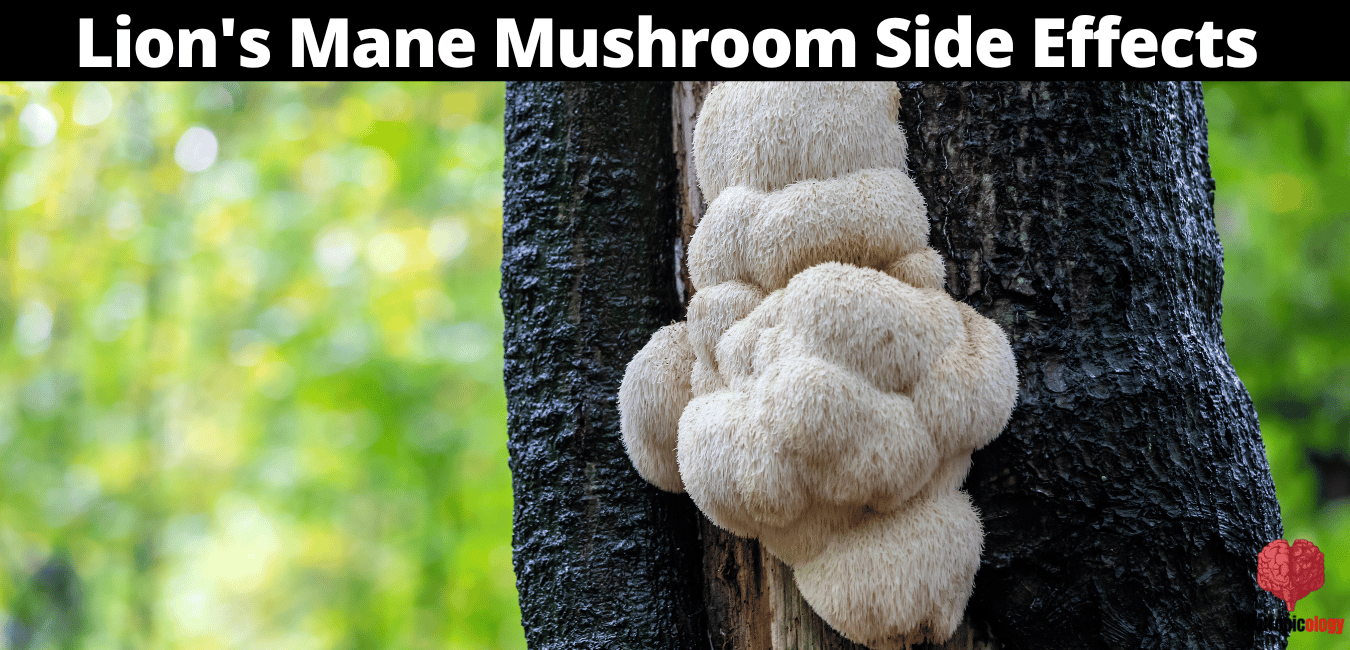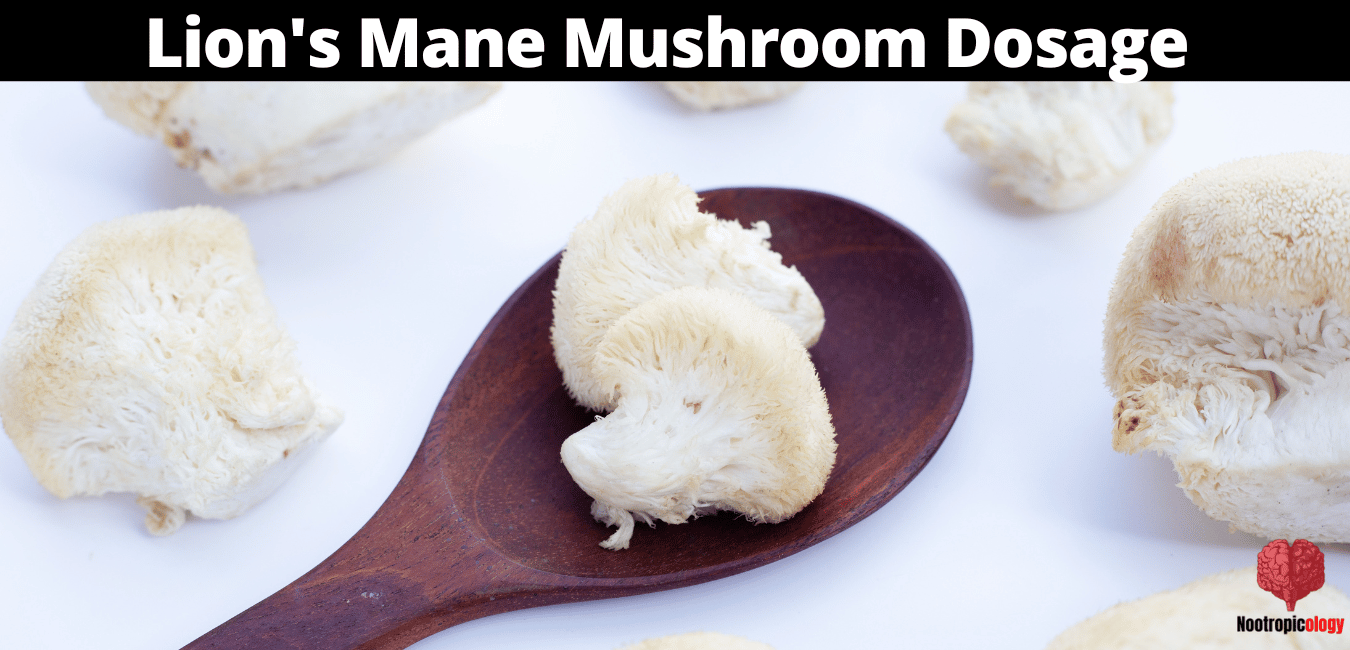Lion's Mane Mushroom Nootropic Review: Benefits, Side Effects & Dosage
In the ever-evolving world of nootropics, it's easy to get lost in the myriad of synthetic compounds and lab-derived formulas. But sometimes, nature presents us with brain-boosting marvels that have stood the test of time. One such gem is the Lion's Mane Mushroom, scientifically known as Hericium erinaceus.
As an avid researcher and self-experimenter in the nootropic space, I've always been drawn to substances that offer cognitive enhancements without straying too far from nature's blueprint. Lion's Mane piqued my interest not just because of its historical significance in traditional Eastern medicine but also due to the mounting modern scientific evidence supporting its brain-health benefits.
In today's world, where information is abundant but genuine knowledge is scarce, my commitment is to provide you with an evidence-based review. A review that not only leans on ancient wisdom but also aligns with contemporary scientific literature. This dual lens ensures that while we benefit from time-tested practices, we're also making informed decisions based on the latest research.
In this comprehensive review, we'll explore the depths of Lion's Mane Mushroom — from its origins and traditional uses to the cutting-edge research illuminating its potential as a powerful nootropic.
What Is Lion's Mane Mushroom?


The intriguing world of fungi has always been a source of wonder and discovery. Among the vast varieties, Lion's Mane stands out, not just for its unique appearance but for its history and therapeutic potential.
Lion's Mane Mushroom, known scientifically as "yamabushitake", is a treasured find across various countries. Especially prevalent in Asian regions like China, its reputation transcends its use as a food source. Thanks to numerous researchers like Fung ML, Wong KH, Lim LW, Naidu M, and more, there's now an expanding body of knowledge on this wonder fungus.
Scientific Classification, Nootropic, and Neurotrophic Mechanism
Lion's Mane Mushroom, Hericium erinaceus, belongs to the tooth fungus group. This edible mushroom is native to North America, Europe, and Asia. Aptly named for its cascading spines that resemble a lion's mane, this mushroom grows predominantly on dead or dying hardwood trees.
For centuries, Lion's Mane has held a special place in traditional Chinese and Japanese medicine. Renowned for its health-boosting properties, it was often consumed as a tonic to improve overall vitality. But its most revered benefit lay in its potential to enhance cognitive functions and nerve health. Ancient practitioners believed in its power to fortify the mind, improve memory, and increase clarity of thought.[1]
The relevance of Lion's Mane in the nootropic community primarily stems from its unique set of compounds known as hericenones and erinacines. These compounds have been found to stimulate the synthesis of Nerve Growth Factor (NGF).[2] NGF is a protein that plays a crucial role in the growth, maintenance, and survival of nerve cells, or neurons.
The promotion of NGF can lead to improved cognitive functions, potentially acting as a buffer against neurodegenerative diseases. This NGF-promoting property sets Lion's Mane apart in the world of nootropics, making it a valuable asset for cognitive health.
Nutritional Value and Culinary Delight
The fruiting body of the Lion's Mane, often found on beech and oak trees, boasts a unique flavor reminiscent of seafood. Besides its culinary appeal, it is laden with polysaccharides, vitamins, and various nutrients beneficial for nutrition.
Whether incorporated into dishes, tea, or coffee, or consumed in powder or supplement form, it adds a dash of health in every type. When shopping at grocery stores, it's vital to read instructions on the page or site for proper preparation and usage.
Therapeutic Properties and Research Insights
Researchers such as Inatomi S, Azumi Y, Chong PS, Sabaratnam V, and others have done extensive studies.[3] Their findings suggest that the Lion's Mane exhibits several activities beneficial for human health. Here are a few:
- Brain Function and Cognition: One of its standout properties is enhancing brain cells and cognition. Adults who consume it regularly have reported improved nervous system functions. The mushroom’s polysaccharides are believed to play a crucial role in this.
- Anti-bacterial and Ulcers: This mushroom exhibits strong anti-bacterial activity, particularly against H. pylori, a bacteria responsible for stomach ulcers.
- Heart Disease and Cholesterol: Studies hint at its potential in reducing cholesterol levels, making it a candidate for combating heart disease.
- Sleep Disorders and Therapy: Some adults have reported better sleep patterns, hinting at its potential therapeutic use in sleep disorders.
- Anti-cancer and Anti-oxidation: Research is underway regarding its potential against cancer, obesity, and its anti-oxidation properties.
Considerations and Advisories
However, like all herbs and supplements, there are factors to consider:
- Bleeding and Blood Clotting: There's a potential risk that it might interfere with blood clotting. If you're on medication for bleeding disorders, consultation with a healthcare provider is paramount.
- Pregnancy: There’s limited data on its effects during pregnancy. It's always prudent to seek advice before consumption.
- Allergies: Rarely, it might cause skin rash. Starting with a smaller size or number is wise, escalating based on individual tolerance.
Lion's Mane mushroom, with its rich biomass and variety of forms from supplement to powder, is making news on the front of natural wellness. While the logo of the mighty Lion's Mane might not be as recognizable as mainstream brands, its benefits are making waves in the scientific community.
Cultures worldwide are embracing it, not just for purposes of nutrition but for its potential therapeutic nootropic and health properties. It's a testament to nature's bounty, where even a single species can bring forth a treasure trove of benefits.
Nootropic Benefits of Lion's Mane Mushroom
The modern scientific realm is gradually uncovering the myriad of benefits associated with Lion's Mane Mushroom. Below, I'll delve into its therapeutic applications, shedding light on the research and anecdotal evidence supporting these claims.
Cognitive Enhancement and Neuroprotection
Lion's Mane is primarily celebrated for its neurotrophic effects, particularly its capacity to promote the synthesis of Nerve Growth Factor (NGF).
Studies have indicated that consistent consumption of this mushroom can potentially bolster cognitive functions, sharpen memory, and enhance focus.[4] These properties are not just beneficial for the aging population in warding off degenerative conditions but can also aid students, professionals, and anyone keen on optimizing their mental capabilities.
Furthermore, research suggests that its neuroprotective qualities can be a potent ally against conditions like Alzheimer's and other neurodegenerative diseases.[5]
Mood Regulation and Anti-Depressive Effects
Apart from its cognitive boosting capabilities, Lion's Mane also shows promise in the realm of mood regulation. Animal studies indicate its potential in alleviating symptoms of anxiety and depression.[6] This is thought to be due to its anti-inflammatory properties, modulation of the gut-brain axis, and influence on neurogenesis.
Immune System Enhancement
Historically used as a health tonic, it's no surprise that Lion's Mane has immune-boosting attributes. The mushroom is packed with beta-glucans, which are known for their immune-modulating properties. By enhancing the immune response, it might provide increased resilience against infections and diseases.[7]
Antioxidant Properties and Overall Vitality
The free radical theory of aging posits that oxidative stress is a significant contributor to the aging process and related ailments. Lion's Mane, rich in antioxidants, can counteract this oxidative stress, possibly leading to a reduction in inflammation and cellular damage. By doing so, it promotes overall vitality and longevity.[8]
The vast array of therapeutic applications of Lion's Mane underscores its versatility and potential in not just the world of nootropics, but also holistic health. The blend of traditional wisdom with modern research paints a promising picture of this unique fungus.
Lion's Mane Mushroom Side Effects and Safety Concerns


While Lion's Mane mushroom is generally regarded as safe for most individuals, it's essential to be aware of potential side effects and contraindications, ensuring optimal benefits with minimal risks.
Common Side Effects:
- Gastrointestinal Disturbances: Some users report experiencing mild stomach upset or diarrhea after consuming Lion's Mane, particularly in higher dosages. This is possibly due to the high fiber content and the body's adjustment to new compounds.
- Allergic Reactions: As with many natural substances, there's potential for allergies. Symptoms can range from a mild rash or itchiness to more severe reactions in hypersensitive individuals. It's crucial to start with smaller dosages and observe any changes.
- Dizziness and Lightheadedness: A small percentage of users have reported feelings of dizziness or lightheadedness after consuming the mushroom. This effect is generally transient and diminishes with continued use.
Interactions with Other Medications:
- Blood Thinning Medications: Due to its potential anti-coagulant effects, it might be prudent for individuals on blood thinners to consult with a healthcare professional before incorporating Lion's Mane into their regimen.
- Hypoglycemic Drugs: Preliminary studies indicate that Lion's Mane might have hypoglycemic properties. Therefore, those on medications to manage diabetes should exercise caution and monitor blood sugar levels closely.
Based on personal observations and anecdotal evidence from fellow nootropic enthusiasts, the majority of users tolerate Lion's Mane well, with many praising its cognitive and mood-enhancing properties. However, as with any supplement, experiences can vary.
It's always advised to listen to one's body, adjust dosages as needed, and consult with a healthcare professional if uncertainties arise.
It's worth noting that the side effects associated with Lion's Mane are generally mild and transient. But a thorough understanding of potential reactions aids in making informed decisions and ensuring a positive experience.
Lion's Mane Mushroom Nootropic Dosage & Cycle


Navigating the vast landscape of nootropics, the question of optimal dosage often arises. With Lion's Mane Mushroom, determining the right amount is crucial not only for efficacy but also to ensure minimal side effects.
Optimal Nootropic Dosage:
- Clinical Studies: The majority of clinical trials on Lion's Mane have used dosages ranging between 500mg to 3g daily. These dosages have shown potential benefits in cognitive enhancement and neuroprotection without significant adverse effects.[9]
- Standardized Extracts: It's important to ensure that any Lion's Mane supplement is standardized to contain the active compounds, mainly hericenones and erinacines. A common recommendation is a daily dose of 1,000mg of a standardized extract.
My Cycling Considerations:
- Tolerance Development: As with many nootropics, the body can develop a tolerance if consumed daily for extended periods. Cycling Lion's Mane Mushroom is not necessary, however, some people choose to cycle it for example, 30 days on, and 30 days off to maintain its efficacy, minimize potential side effects, and keep it budget-friendly.
- Long-term Use: There's no conclusive evidence suggesting detrimental effects from long-term consumption. However, periodic breaks might enhance its benefits and reduce the chance of potential side effects.
Stacking with Other Nootropics:
- Synergistic Combinations: Lion's Mane can be effectively combined with other cognitive enhancers. Popular stacks include coupling with Bacopa Monnieri for enhanced memory or with Rhodiola Rosea for stress relief and improved focus.
- Cholinergic System: Due to its potential impact on nerve growth factor (NGF), Lion's Mane might synergize well with nootropics that influence the cholinergic system, like racetams or alpha-GPC.
- Warnings and Guidelines: When stacking, it's essential to consider the combined effect of multiple substances. Starting with lower doses and gradually adjusting is a cautious approach.
Personally, I recommend using Mind Lab Pro which contains high-quality Lion's Mane Mushroom as well as other nootropics that work synergistically. I'll go more into detail below.
Why I Opt for Mind Lab Pro: A Superior Nootropic Blend
In a market saturated with various nootropic supplements and cognitive enhancers, discerning the right fit can be a daunting task. One name, however, has consistently risen above the rest in my journey with nootropics: Mind Lab Pro.
Here’s why I advocate for this exceptional blend, especially for its incorporation of Lion's Mane Mushroom:
1. Comprehensive Cognitive Enhancement: While standalone Lion's Mane offers numerous benefits, Mind Lab Pro takes cognitive enhancement to the next level by synergizing it with other potent nootropics. This all-in-one approach ensures a broad spectrum of cognitive benefits, from improved memory and focus to enhanced mood and creativity.
2. Premium Quality and Purity: Mind Lab Pro prides itself on using only the highest quality ingredients. Their Lion's Mane extract, for instance, is sourced meticulously to ensure it contains the most bioactive constituents. This commitment to purity translates into better results and fewer side effects.
3. Transparent Labeling and Research-Backed Formulation: Unlike many competitors who hide behind proprietary blends, Mind Lab Pro is transparent about the exact amounts and sources of each ingredient. Each component, including Lion's Mane, is backed by robust scientific research, ensuring users receive a product that's both safe and effective.
4. Holistic Brain Health: More than just boosting immediate cognitive functions, Mind Lab Pro is designed for long-term brain health. The inclusion of Lion's Mane, known for its neurogenerative properties, exemplifies this commitment. When combined with other ingredients like maritime pine bark or phosphatidylserine, the blend supports overall neural health, neuroplasticity, and resilience against age-related cognitive decline.
5. Cost-Effective and Convenient: While sourcing individual nootropics can be a hassle and often costlier, Mind Lab Pro offers a comprehensive solution in a single capsule. This not only simplifies dosing but also makes it a cost-effective choice in the long run.
In essence, while standalone Lion's Mane products offer notable cognitive enhancements, Mind Lab Pro elevates the experience by offering a holistic, research-backed, and quality-assured nootropic blend. It's a product crafted for discerning individuals who seek the best for their cognitive health and performance.
My Personal Reflections and Experiences with Lion's Mane Mushroom
Stepping into the realm of nootropics is an exploration, and Lion's Mane Mushroom was indeed a noteworthy chapter in my journey. This fascinating fungus, which appears more like something from a fairytale than a cognitive enhancer, took me by surprise with its profound effects.
- A Natural Cognitive Enhancer: Unlike many synthetic nootropics, Lion's Mane provides a subtle, yet noticeable, elevation in cognitive functioning. Within a week of consumption, I experienced enhanced focus, and over a month, there was a noticeable improvement in memory recall and mental clarity.
- Mood and Well-being: More than just cognitive enhancement, Lion's Mane brought about a sense of well-being. The days seemed brighter, and tasks felt less daunting. This was not a drastic shift but a gentle nudge towards a positive state of mind.
- Interactions with Other Nootropics: Stacking Lion's Mane with other nootropics yielded varied results. While its combination with Bacopa Monnieri seemed to amplify memory-enhancing effects, I found that coupling it with stimulants like caffeine, or even Modafinil, required a careful balance to prevent overstimulation.
- Safety and Side Effects: Throughout my experimentation, I noticed a few days of mild stomach discomfort when starting with a higher dose. This underscores the importance of starting slow and allowing the body to adjust. Also, I found that cycling, as usually recommended, helped in maintaining its efficacy over extended periods.
- Purchasing Lion's Mane: Quality matters, especially when choosing a supplement. I've consistently sourced my Lion's Mane from reputable vendors, with Mind Lab Pro, being a personal favorite due to its commitment to quality, research, and transparent testing.
Overall, Lion's Mane Mushroom has solidified its place in my nootropic repertoire. It stands as a testament that nature, in all its wisdom, offers compounds that can enhance our cognitive capacities, promote neural health, and elevate our well-being.
As with any supplement, personal experiences might vary, but for those embarking on this journey, Lion's Mane is undoubtedly worth exploring.
The Intricate Relationship Between Mushrooms and Cognitive Health: An In-Depth Look
Mushrooms have always been a source of fascination, not only as a food source but also for their therapeutic potential. A plethora of articles and studies highlight the incredible medicinal benefits they offer. Among the various mushrooms, there's one that stands out in the realm of cognitive health: the Lion's Mane mushroom.
Studies Involving Mice and Humans
Pioneering studies, particularly those that involve mice, have shown promising results. In these studies, the mycelium extracts of the mushroom, when administered to mice, have demonstrated significant improvements in memory, energy and cognitive functions.[10] It is believed that these results stem from the mushroom's ability to stimulate nerve growth factor, which plays a vital role in maintaining and regenerating nerves in the brain.
But it's not just in mice. Clinical trials involving humans have been increasingly more frequent. A noteworthy study involved patients with mild cognitive impairment. Over the course of 16 weeks, the patients were administered mushroom capsules. The outcomes were promising. These patients showed significant cognitive improvement, especially when compared to the placebo group.
Alzheimer's Disease and Dementia
It's no secret that Alzheimer's disease and dementia are among the most challenging conditions that medical professionals face today. The doctor community has been on the constant lookout for potential treatments and preventive measures. The Lion's Mane mushroom, with its nerve-boosting activity, is emerging as a potential ally in this battle. While it's not a cure, early findings suggest that regular consumption might slow the progression of these diseases and enhance the quality of life for patients.
Incorporating Lion's Mane into Diet
As a food, Lion's Mane mushrooms can be a delightful addition to culinary dishes. They offer a seafood-like taste, often likened to crab or lobster. However, to harness its therapeutic potential, especially concerning cognitive health, capsules containing concentrated extracts are recommended. Before starting any supplementation, it's always best to consult with a doctor to ensure it's suitable for individual health conditions.
The relationship between mushrooms, particularly Lion's Mane, and cognitive health is intricate and profound. The mycelium, the root-like part of the mushroom, is where much of its power is believed to reside. As more articles and research papers delve into this topic, we're inching closer to fully understanding its potential and harnessing it for the benefit of patients worldwide.
Frequently Asked Questions (FAQ)
How does Lion's Mane Mushroom support cognitive function?
Lion's Mane Mushroom contains compounds known as hericenones and erinacines, which stimulate the synthesis of nerve growth factor (NGF). NGF plays a pivotal role in maintaining and regenerating neurons, thereby promoting cognitive function and neuroplasticity.
Can Lion's Mane Mushroom enhance memory and learning?
Several studies suggest that Lion's Mane supplementation can bolster memory and learning capabilities, likely due to its role in enhancing neuroplasticity and its neuroprotective effects.
How long does it take to notice the cognitive benefits of Lion's Mane Mushroom?
The onset of cognitive benefits varies among individuals. While some users report noticing effects within a few days, others might take several weeks. Consistency and appropriate dosage are key.
What is the half-life of Lion's Mane?
The specific half-life of Lion's Mane and its active components is not well-documented in the current literature. However, as with most natural supplements, the effects of Lion's Mane are often cumulative, with benefits becoming more noticeable after consistent use over weeks or months rather than hours.
Can Lion's Mane support brain health in an aging population?
Yes, several studies indicate Lion's Mane's potential in supporting cognitive function in the elderly, possibly reducing the risk of neurodegenerative diseases. Its ability to stimulate NGF production means it might aid in neuron maintenance and regeneration, vital for aging brains.
How does the neuroprotective effect of Lion's Mane work?
Lion's Mane offers neuroprotective properties primarily through its promotion of NGF synthesis, reducing inflammation in neural tissues, and its antioxidant capacity, which shields neurons from oxidative stress.
How does Lion's Mane affect sleep patterns and dream quality?
Anecdotal reports suggest that some users experience more vivid dreams and improved sleep quality with Lion's Mane supplementation. This might be related to its role in enhancing overall brain health, though direct scientific research in this area is still sparse.
Are there any dietary sources of Lion's Mane, or is supplementation the best approach?
Lion's Mane is not only a nootropic but also an edible mushroom. It can be cooked and consumed as part of a meal. However, for consistent and concentrated cognitive benefits, supplementation, which provides a standardized dose of its active compounds, is often recommended.
My Final Thoughts on Lion's Mane Mushroom
Navigating the intricate landscape of nootropics has exposed me to a plethora of compounds, each promising cognitive enhancement and improved brain health. Yet, few have left as lasting an impression as the Lion's Mane Mushroom.
Historically revered in ancient medicinal practices, Lion's Mane has found a rightful place in the modern nootropic community, not just because of tradition, but due to compelling research. The mushroom's unique ability to stimulate nerve growth factor synthesis underscores its potential in neuroprotection and cognitive restoration. These properties are particularly pertinent in an age where neurodegenerative diseases pose significant challenges.
My journey with Lion's Mane, both as a standalone supplement and within the Mind Lab Pro blend, has been largely positive. The subtle but palpable enhancements in memory, mood, and overall cognitive agility reaffirmed much of what the scientific literature has propounded. Yet, it's essential to note that while Lion's Mane stands out, it's not a panacea. Individual responses can vary, and it's always vital to approach supplementation with informed guidance and a well-researched regime.
As for sourcing, the burgeoning popularity of Lion's Mane means the market is rife with options. Yet, quality varies widely. That's where vendors like Mind Lab Pro shine, offering a meticulously crafted blend with premium Lion's Mane extract.
In conclusion, Lion's Mane Mushroom, with its unique neurogenerative properties and cognitive benefits, undoubtedly earns its spotlight in the nootropic world. Yet, like all supplements, it demands respect, understanding, and careful integration into one's cognitive health regimen.
- Saitsu, Yuusuke et al. “Improvement of cognitive functions by oral intake of Hericium erinaceus.” Biomedical research (Tokyo, Japan) vol. 40,4 (2019): 125-131. doi:10.2220/biomedres.40.125 ↑
- Li, I-Chen et al. “Neurohealth Properties of Hericium erinaceus Mycelia Enriched with Erinacines.” Behavioural neurology vol. 2018 5802634. 21 May. 2018, doi:10.1155/2018/5802634 ↑
- Mori, Koichiro et al. “Improving effects of the mushroom Yamabushitake (Hericium erinaceus) on mild cognitive impairment: a double-blind placebo-controlled clinical trial.” Phytotherapy research : PTR vol. 23,3 (2009): 367-72. doi:10.1002/ptr.2634 ↑
- Ratto, Daniela et al. “Hericium erinaceus Improves Recognition Memory and Induces Hippocampal and Cerebellar Neurogenesis in Frail Mice during Aging.” Nutrients vol. 11,4 715. 27 Mar. 2019, doi:10.3390/nu11040715 ↑
- Li, I-Chen et al. “Prevention of Early Alzheimer's Disease by Erinacine A-Enriched Hericium erinaceus Mycelia Pilot Double-Blind Placebo-Controlled Study.” Frontiers in aging neuroscience vol. 12 155. 3 Jun. 2020, doi:10.3389/fnagi.2020.00155 ↑
- Rodriguez, Mya N, and Stephen L P Lippi. “Lion's Mane (Hericium erinaceus) Exerts Anxiolytic Effects in the rTg4510 Tau Mouse Model.” Behavioral sciences (Basel, Switzerland) vol. 12,7 235. 15 Jul. 2022, doi:10.3390/bs12070235 ↑
- Akramiene, Dalia et al. “Effects of beta-glucans on the immune system.” Medicina (Kaunas, Lithuania) vol. 43,8 (2007): 597-606. ↑
- Ghosh, Sandipta et al. “Prospecting medicinal properties of Lion's mane mushroom.” Journal of food biochemistry, e13833. 24 Jun. 2021, doi:10.1111/jfbc.13833 ↑
- Chong, Pit Shan et al. “Therapeutic Potential of Hericium erinaceus for Depressive Disorder.” International journal of molecular sciences vol. 21,1 163. 25 Dec. 2019, doi:10.3390/ijms21010163 ↑
- Ho, Chun-Sheng et al. “Effect of Coriolus versicolor Mycelia Extract on Exercise Performance and Physical Fatigue in Mice.” International journal of medical sciences vol. 14,11 1110-1117. 4 Sep. 2017, doi:10.7150/ijms.20547 ↑
